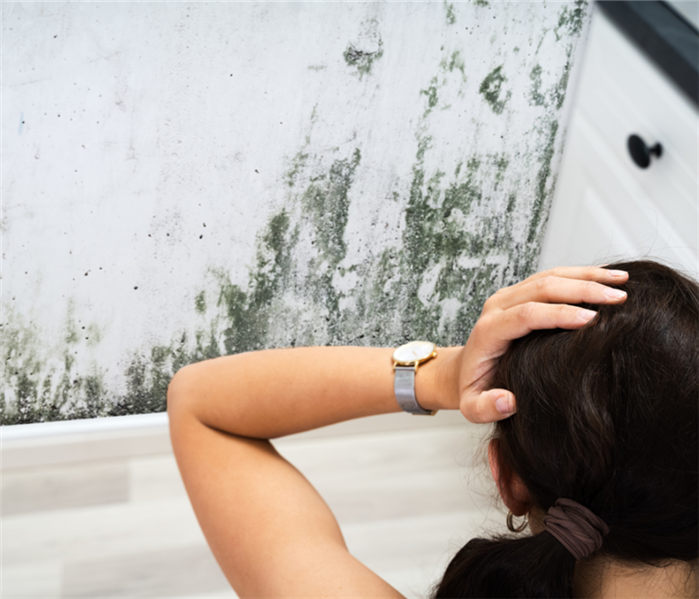Finding the hidden menace: understanding mold in your home
1/29/2024 (Permalink)
Imagine this: whether you're unlocking the entrance to your comfy house after a long day or coming into your bustling company space, ready to serve customers, a strange odor draws your attention. As you examine, your gaze falls on a faint yet threatening intruder—mold. This uninvited guest sees no difference between the comfort of your house and the professionalism of your business; it thrives in both. Mold is not simply an eyesore; it may also cause health problems and threaten the fundamental structure of your home. In this essay, we will look at the hidden nature of mold, including its sources, associated risks, and possible treatments. Knowing about and managing mold-related dangers is critical for maintaining an enjoyable and secure atmosphere for everybody, whether you own a house or a commercial property.
- What is mold?
Mold is a fungus of microscopic size that multiplies by air through spores and can occur both indoors and out in areas with high humidity. Mold is commonly seen in residential and commercial properties as fuzzy, discolored areas on walls, ceilings, and other surfaces. It reproduces by releasing microscopic spores into the air, which seek out wet places to settle and thrive in. Mold plays a crucial role in nature, but its presence indoors can be problematic.
- What causes mold to grow in residential and commercial buildings?
Understanding which conditions stimulate mold growth is critical. Mold flourishes in situations with high moisture levels, and several factors contribute to its spread:
- Leaks: Undetected leaks, whether from roofs, pipes, or appliances, provide an ongoing source of moisture, creating a fantastic breeding ground for mold.
- Water damage: If previous water damage, such as flooding or spills, fails to be properly handled, residual moisture may build up and promote mold growth.
- Poor ventilation: keeps moisture indoors, particularly in enclosed places such as restrooms, kitchens, and storage rooms.
- High humidity levels: Elevated humidity levels, which are common in humid places, create an environment conducive to mold growth.
- How can mold affect your health?
Mold can have a variety of effects on health, ranging from minor discomfort to serious respiratory problems. Here's a quick overview:
- Allergic reactions: Mold spores are allergens that can cause sneezing, runny nose, itchy eyes, and skin irritation.
- Respiratory issues: Mold exposure can exacerbate symptoms of asthma, such as coughing, wheezing, and difficulty breathing.
- Skin irritation: Direct contact with mold can irritate the skin.
- Individuals with compromised immune systems: may be more vulnerable to fungal infections caused by specific forms of mold.
- Can mold be detected before it becomes visible?
Yes, mold can be detected before it becomes visible. There are several ways to detect mold early on:
- Musty Odor: Mold often produces a distinct musty smell. If you notice an unusual odor in your home or building, it could indicate the presence of mold.
- Water Damage: Mold thrives in damp and moist environments. If you have experienced any water leaks or damage, it is important to thoroughly inspect and address any potential mold growth.
- Hidden Mold: Mold can grow in hidden areas such as behind walls, under flooring, or inside ceilings2. These areas may not be immediately visible, but if you suspect mold growth, a professional inspection may be necessary.
- Allergy Symptoms: Some individuals may experience allergic reactions, such as sneezing, coughing, or respiratory issues when mold is present. If you or others in your home are experiencing unexplained allergy symptoms, it could be a sign of hidden mold.
Regular examinations, even in places that are not easily visible, are critical for early discovery. Pay attention to hidden areas such as basements, crawl spaces, and under furniture. Controlling mold in its early stages is critical to preventing major damage and health problems.
- How can mold growth be prevented and controlled?
- Check that your home or company has adequate air circulation. Use exhaust fans in bathrooms and kitchens to minimize humidity and prevent moisture buildup. Leaks should be repaired as quickly as feasible. To prevent mold from forming, take immediate action if you notice a leaking roof, a plumbing problem, or a broken appliance.
- Ideal indoor humidity levels range from 30 to 50%. Use dehumidifiers in wet areas, especially basements, and consider utilizing air conditioners to minimize humidity during hot weather.
- Use mold-resistant products, especially in moisture-prone areas like bathrooms and basements. Mold-resistant drywall and coatings may give an additional layer of protection.
- Inspect your property regularly, focusing on moisture-prone areas. Regular exams can help discover and manage defects before they become serious issues.
Mold prevention is a constant endeavor that requires a combination of good practices and consciousness. By adopting these strategies, you create a less favorable atmosphere for mold, reducing the risk of infestations and related issues.
Mold is a difficulty that requires awareness and preventative measures, whether you run a pleasant house or a thriving business. Understanding the factors that contribute to mold growth and taking prompt action can help you keep your living or working environment healthy and friendly for everybody. Stay well-informed be proactive, and let the struggle against mold begin with awareness and instruction.
Investing in mold protection today safeguards the property and its occupants.
For professional mold remediation services, call SERVPRO at (480) 503-2090. Trust SERVPRO for reliable mold remediation, abatement, and restoration. Secure your space with us—prevention is the first line of defense.

 24/7 Emergency Service
24/7 Emergency Service
